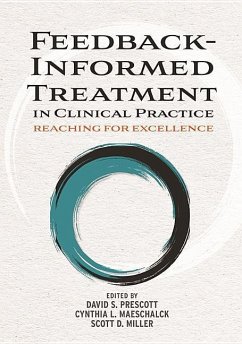Feedback-Informed Treatment in Clinical Practice: Reaching for Excellence
Herausgeber: Prescott, David S.; Miller, Scott D.; Maeschalck, Cynthia L.
Feedback-Informed Treatment in Clinical Practice: Reaching for Excellence
Herausgeber: Prescott, David S.; Miller, Scott D.; Maeschalck, Cynthia L.
- Gebundenes Buch
- Merkliste
- Auf die Merkliste
- Bewerten Bewerten
- Teilen
- Produkt teilen
- Produkterinnerung
- Produkterinnerung
This practical guide demonstrates how clinicians can use structured yet flexible measures to gather ongoing, real-time client feedback to monitor and strengthen client outcomes and the therapeutic alliance.
Andere Kunden interessierten sich auch für
![Prevention of Treatment Failure: The Use of Measuring, Monitoring, and Feedback in Clinical Practice Prevention of Treatment Failure: The Use of Measuring, Monitoring, and Feedback in Clinical Practice]() Michael J. LambertPrevention of Treatment Failure: The Use of Measuring, Monitoring, and Feedback in Clinical Practice58,99 €
Michael J. LambertPrevention of Treatment Failure: The Use of Measuring, Monitoring, and Feedback in Clinical Practice58,99 €![Building Your Ideal Private Practice: A Guide for Therapists and Other Healing Professionals Building Your Ideal Private Practice: A Guide for Therapists and Other Healing Professionals]() Lynn GrodzkiBuilding Your Ideal Private Practice: A Guide for Therapists and Other Healing Professionals50,99 €
Lynn GrodzkiBuilding Your Ideal Private Practice: A Guide for Therapists and Other Healing Professionals50,99 €![Therapeutic Alliances in Couple and Family Therapy: An Empirically Informed Guide to Practice Therapeutic Alliances in Couple and Family Therapy: An Empirically Informed Guide to Practice]() Myrna L. FriedlanderTherapeutic Alliances in Couple and Family Therapy: An Empirically Informed Guide to Practice18,99 €
Myrna L. FriedlanderTherapeutic Alliances in Couple and Family Therapy: An Empirically Informed Guide to Practice18,99 €![Treatment Integrity: A Foundation for Evidence-Based Practice in Applied Psychology Treatment Integrity: A Foundation for Evidence-Based Practice in Applied Psychology]() Treatment Integrity: A Foundation for Evidence-Based Practice in Applied Psychology96,99 €
Treatment Integrity: A Foundation for Evidence-Based Practice in Applied Psychology96,99 €![Group Development in Practice: Guidance for Clinicians and Researchers on Stages and Dynamics of Change Group Development in Practice: Guidance for Clinicians and Researchers on Stages and Dynamics of Change]() Virginia BrabenderGroup Development in Practice: Guidance for Clinicians and Researchers on Stages and Dynamics of Change29,99 €
Virginia BrabenderGroup Development in Practice: Guidance for Clinicians and Researchers on Stages and Dynamics of Change29,99 €![Family Therapy and Systemic Practice: Readings on Child Protection, Clinical Techniques and Empirical Foundations Family Therapy and Systemic Practice: Readings on Child Protection, Clinical Techniques and Empirical Foundations]() Alan CarrFamily Therapy and Systemic Practice: Readings on Child Protection, Clinical Techniques and Empirical Foundations139,99 €
Alan CarrFamily Therapy and Systemic Practice: Readings on Child Protection, Clinical Techniques and Empirical Foundations139,99 €![Handbook of Psychotherapy and Religious Diversity Handbook of Psychotherapy and Religious Diversity]() Handbook of Psychotherapy and Religious Diversity108,99 €
Handbook of Psychotherapy and Religious Diversity108,99 €-
-
-
This practical guide demonstrates how clinicians can use structured yet flexible measures to gather ongoing, real-time client feedback to monitor and strengthen client outcomes and the therapeutic alliance.
Hinweis: Dieser Artikel kann nur an eine deutsche Lieferadresse ausgeliefert werden.
Hinweis: Dieser Artikel kann nur an eine deutsche Lieferadresse ausgeliefert werden.
Produktdetails
- Produktdetails
- Verlag: American Psychological Association (APA)
- Seitenzahl: 368
- Erscheinungstermin: 19. Juni 2017
- Englisch
- Abmessung: 261mm x 182mm x 27mm
- Gewicht: 793g
- ISBN-13: 9781433827747
- ISBN-10: 1433827743
- Artikelnr.: 48141349
- Herstellerkennzeichnung
- Produktsicherheitsverantwortliche/r
- Europaallee 1
- 36244 Bad Hersfeld
- gpsr@libri.de
- Verlag: American Psychological Association (APA)
- Seitenzahl: 368
- Erscheinungstermin: 19. Juni 2017
- Englisch
- Abmessung: 261mm x 182mm x 27mm
- Gewicht: 793g
- ISBN-13: 9781433827747
- ISBN-10: 1433827743
- Artikelnr.: 48141349
- Herstellerkennzeichnung
- Produktsicherheitsverantwortliche/r
- Europaallee 1
- 36244 Bad Hersfeld
- gpsr@libri.de
Edited by David S. Prescott, Cynthia L. Maeschalck, and Scott D. Miller
Contributors
Introduction
Part I. Feedback-Informed Treatment Theories and General Practice
1. Feedback-Informed Treatment: Historical and Empirical Foundations
2. Feedback-Informed Treatment: An Overview of the Basics and Core
Competencies
3. Using Client Feedback to Inform Treatment
4. Achieving Excellence Through Feedback-Informed Supervision
5. Implementing Feedback-Informed Treatment: Challenges and Solutions
Part II. Feedback-Informed Treatment in Specific Settings
6. Feedback-Informed Treatment in a Private Practice Setting: Personal
Advice and Professional Experience
7. Feedback-Informed Group Treatment: Application of the OQ–45 and Group
Questionnaire
8. Feedback-Informed Treatment in Agency and Clinic Settings
9. Feedback-Informed Treatment in an Agency Serving Children, Youth, and
Families
10. Feedback-Informed Treatment With Couples
11. Feedback-Informed Treatment in an Addiction Treatment Agency
12. Feedback-Informed Treatment With LGBTQ Clients: Social Justice and
Evidence-Based Practice
13. Feedback-Informed Treatment With Clients in the Criminal Justice
System: The Time Is Now
14. Feedback-Informed Treatment for Adolescents and Young Adults With
Early-Onset Psychotic Disorders: Developmentally Appropriate Mental Health
Services and the Need for Relevant Outcome Measures
15. Facilitating the Therapeutic Alliance Between Pharmacists and Patients
to Improve Medication Adherence
Part III. Professional Development in the Pursuit of Excellence
16. The Practice and the Practical: Pushing Your Clinical Performance to
the Next Level
Index
About the Editors
Introduction
Part I. Feedback-Informed Treatment Theories and General Practice
1. Feedback-Informed Treatment: Historical and Empirical Foundations
2. Feedback-Informed Treatment: An Overview of the Basics and Core
Competencies
3. Using Client Feedback to Inform Treatment
4. Achieving Excellence Through Feedback-Informed Supervision
5. Implementing Feedback-Informed Treatment: Challenges and Solutions
Part II. Feedback-Informed Treatment in Specific Settings
6. Feedback-Informed Treatment in a Private Practice Setting: Personal
Advice and Professional Experience
7. Feedback-Informed Group Treatment: Application of the OQ–45 and Group
Questionnaire
8. Feedback-Informed Treatment in Agency and Clinic Settings
9. Feedback-Informed Treatment in an Agency Serving Children, Youth, and
Families
10. Feedback-Informed Treatment With Couples
11. Feedback-Informed Treatment in an Addiction Treatment Agency
12. Feedback-Informed Treatment With LGBTQ Clients: Social Justice and
Evidence-Based Practice
13. Feedback-Informed Treatment With Clients in the Criminal Justice
System: The Time Is Now
14. Feedback-Informed Treatment for Adolescents and Young Adults With
Early-Onset Psychotic Disorders: Developmentally Appropriate Mental Health
Services and the Need for Relevant Outcome Measures
15. Facilitating the Therapeutic Alliance Between Pharmacists and Patients
to Improve Medication Adherence
Part III. Professional Development in the Pursuit of Excellence
16. The Practice and the Practical: Pushing Your Clinical Performance to
the Next Level
Index
About the Editors
Contributors
Introduction
Part I. Feedback-Informed Treatment Theories and General Practice
1. Feedback-Informed Treatment: Historical and Empirical Foundations
2. Feedback-Informed Treatment: An Overview of the Basics and Core
Competencies
3. Using Client Feedback to Inform Treatment
4. Achieving Excellence Through Feedback-Informed Supervision
5. Implementing Feedback-Informed Treatment: Challenges and Solutions
Part II. Feedback-Informed Treatment in Specific Settings
6. Feedback-Informed Treatment in a Private Practice Setting: Personal
Advice and Professional Experience
7. Feedback-Informed Group Treatment: Application of the OQ–45 and Group
Questionnaire
8. Feedback-Informed Treatment in Agency and Clinic Settings
9. Feedback-Informed Treatment in an Agency Serving Children, Youth, and
Families
10. Feedback-Informed Treatment With Couples
11. Feedback-Informed Treatment in an Addiction Treatment Agency
12. Feedback-Informed Treatment With LGBTQ Clients: Social Justice and
Evidence-Based Practice
13. Feedback-Informed Treatment With Clients in the Criminal Justice
System: The Time Is Now
14. Feedback-Informed Treatment for Adolescents and Young Adults With
Early-Onset Psychotic Disorders: Developmentally Appropriate Mental Health
Services and the Need for Relevant Outcome Measures
15. Facilitating the Therapeutic Alliance Between Pharmacists and Patients
to Improve Medication Adherence
Part III. Professional Development in the Pursuit of Excellence
16. The Practice and the Practical: Pushing Your Clinical Performance to
the Next Level
Index
About the Editors
Introduction
Part I. Feedback-Informed Treatment Theories and General Practice
1. Feedback-Informed Treatment: Historical and Empirical Foundations
2. Feedback-Informed Treatment: An Overview of the Basics and Core
Competencies
3. Using Client Feedback to Inform Treatment
4. Achieving Excellence Through Feedback-Informed Supervision
5. Implementing Feedback-Informed Treatment: Challenges and Solutions
Part II. Feedback-Informed Treatment in Specific Settings
6. Feedback-Informed Treatment in a Private Practice Setting: Personal
Advice and Professional Experience
7. Feedback-Informed Group Treatment: Application of the OQ–45 and Group
Questionnaire
8. Feedback-Informed Treatment in Agency and Clinic Settings
9. Feedback-Informed Treatment in an Agency Serving Children, Youth, and
Families
10. Feedback-Informed Treatment With Couples
11. Feedback-Informed Treatment in an Addiction Treatment Agency
12. Feedback-Informed Treatment With LGBTQ Clients: Social Justice and
Evidence-Based Practice
13. Feedback-Informed Treatment With Clients in the Criminal Justice
System: The Time Is Now
14. Feedback-Informed Treatment for Adolescents and Young Adults With
Early-Onset Psychotic Disorders: Developmentally Appropriate Mental Health
Services and the Need for Relevant Outcome Measures
15. Facilitating the Therapeutic Alliance Between Pharmacists and Patients
to Improve Medication Adherence
Part III. Professional Development in the Pursuit of Excellence
16. The Practice and the Practical: Pushing Your Clinical Performance to
the Next Level
Index
About the Editors








